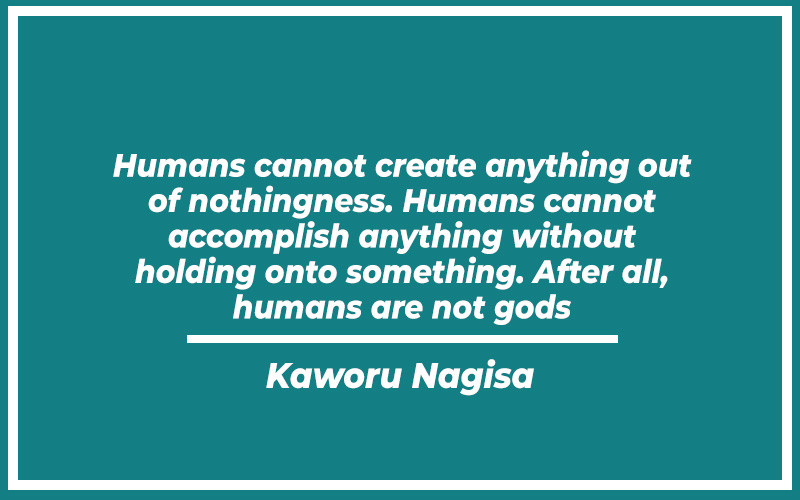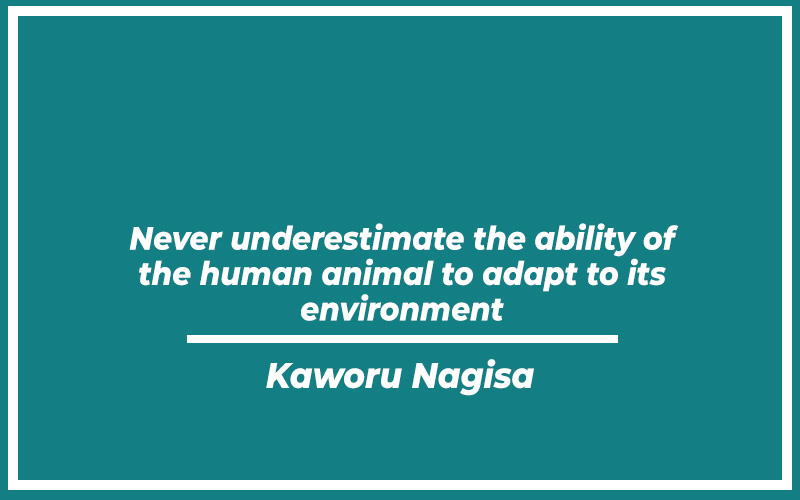If you’re looking for a series that blends deep philosophical questions with thrilling mecha action, then “Neon Genesis Evangelion” is something you can’t miss.
This iconic anime challenges not just the norms of its genre but also invites you to think deeply about complex themes like identity, purpose, and human existence.
As you dive into the world of Evangelion, you’ll find yourself immersed in the struggles of its characters, especially the young pilots fighting to save humanity while grappling with their own personal demons. It’s a gripping, sometimes bewildering journey that stays with you long after you’ve finished watching.
Best Evangelion Quotes

“Humans cannot create anything out of nothingness. Humans cannot accomplish anything without holding onto something. After all, humans are not gods.” – Kaworu Nagisa
Kaworu Nagisa’s quote challenges the myth of total originality in human creativity, suggesting that everything humans create is derived from existing materials or ideas.
This perspective underscores the limitations of human creativity as compared to divine omnipotence, framing humanity’s creative efforts as inherently dependent on what already exists. It reflects a broader philosophical inquiry into the nature and limits of human achievement, highlighting our dependence on the tangible and the known
Also Read:Duke Ellington Quotes (with Explanation)
“The fact that you have a place where you can return home, will lead you to happiness. That is a good fact.” – Kaworu Nagisa
Kaworu’s statement emphasizes the psychological comfort and stability that a home represents. Having a “place to return” symbolizes safety and belonging, fundamental elements that contribute to an individual’s happiness and mental health.
This quote reflects on the broader human need for a secure base in life, which fosters happiness by providing a sense of continuity and protection against life’s uncertainties. It also touches on the themes of belonging and security as foundational to human well-being
“I still don’t know where to find happiness. But I’ll continue to think about whether it’s good to be here…whether it was good to have been born. But in the end, it’s just realizing the obvious over and over again. Because I am myself.” – Shinji Ikari
Shinji Ikari expresses a profound sense of existential uncertainty and introspection. His struggle with understanding his place in the world and the inherent value of his existence is a candid reflection on the human condition.
This quote encapsulates the ongoing internal debate many face about the meaning of life and personal identity. Shinji’s thoughts also highlight the cyclical nature of self-realization, suggesting that self-understanding involves repeatedly confronting fundamental truths about oneself
“No one can justify life by linking happy moments into a rosary.” – Shinji Ikari
Shinji articulates a critique of the idea that life can be made worthwhile solely through a collection of happy moments. This perspective suggests that understanding life’s value requires a deeper engagement with all of its complexities, not just the joyful experiences.
The quote challenges more superficial approaches to finding meaning in life, advocating for a more nuanced appreciation that includes understanding and accepting suffering and struggle as integral parts of human existence
“This is man’s ultimate fighting machine the synthetic life form known as Evangelion, Unit 1. Built here in secret, it is mankind’s last hope.” – Ritsuko Akagi
Ritsuko Akagi’s quote introduces the Evangelion as a pinnacle of human ingenuity and a desperate measure against existential threats. The Evangelion, a synthesis of technology and biology, symbolizes humanity’s last stand against forces beyond their control.
This declaration highlights the themes of survival and the extreme measures that humanity will take to preserve itself. It reflects on the broader narrative of human resilience and innovation in the face of overwhelming odds
“This city is a fortress designed to stand against the angels. This is Tokyo-3, this is our city and it’s the city that you saved.” – Misato Katsuragi
Misato’s words underscore the strategic and symbolic importance of Tokyo-3 as both a physical and emotional fortress for humanity. By calling it a city “you saved,” she personalizes the narrative, emphasizing the role of individual heroics in the collective survival of humanity.
The quote speaks to the broader themes of sacrifice and the human capacity to protect and preserve their communities in the face of existential threats, highlighting the intertwined fates of individuals and their societies
“Even though a hedgehog may want to become close with another hedgehog. The closer they get the more they injure each other with their spines.” – Ritsuko Akagi
Ritsuko Akagi’s metaphor of the hedgehogs illustrates the paradoxical nature of human intimacy. This quote explores the inherent conflict between the desire for closeness and the pain that often comes with vulnerability and exposure.
It suggests that emotional proximity can lead to emotional pain, a theme that resonates deeply in interpersonal relationships. The “hedgehog’s dilemma” is a philosophical and psychological reflection on the complexities of human interaction and the challenges of achieving true intimacy without emotional injury.
“Anywhere can be paradise as long as you have the will to live. After all, you are alive, so you will always have the chance to be happy.” – Yui Ikari
Yui Ikari’s quote reflects an optimistic view of life, suggesting that one’s mindset can transform any situation into a paradise. This perspective emphasizes the power of human will and resilience, advocating for a life-affirming attitude regardless of circumstances.
It underscores the belief that happiness is attainable as long as one chooses to pursue it actively, framing life itself as an opportunity for joy and fulfillment, thus offering a hopeful outlook that motivates perseverance.
“Man cannot erase this sadness, because all men are fundamentally alone.” – Kaworu Nagisa
Kaworu Nagisa’s statement touches on the existential solitude of the human condition, suggesting that inherent loneliness is a source of pervasive sadness that cannot be fully eliminated.
This view reflects philosophical themes of existentialism, where the isolation of the individual is an unavoidable reality. It challenges the viewer to confront and perhaps accept this fundamental aspect of human nature, proposing that understanding our intrinsic solitude might lead to a more profound acceptance of self and others.
“Man fears the darkness, and so he scrapes away at the edges of it with fire.” – Rei Ayanami
Rei Ayanami’s quote metaphorically captures humanity’s fear of the unknown and our attempts to control or illuminate the dark aspects of life. Fire, representing knowledge and technology, is used by humans to fend off the uncertainty and fears that come with darkness.
This speaks to a broader human tendency to seek control over what is feared or not understood, and the ongoing battle between human vulnerability and the quest for understanding and mastery over our environment.
“You don’t want to be by yourself, correct? We are many but you are alone. You hate it, don’t you?” – Rei Ayanami
This introspective quote by Rei Ayanami explores the theme of alienation and the human desire for connection. It confronts the individual with the paradox of being surrounded by many yet feeling fundamentally isolated.
This dialogue encourages reflection on personal feelings of loneliness and the human condition of seeking, yet often struggling with, social connections. It challenges the listener to acknowledge their fears of isolation and consider the universal struggle to find and maintain meaningful relationships.
“This song is good. Singing brings joy and revitalization of the human soul. I think that song is the highest achievement of the Lilim culture.” – Kaworu Nagisa
Kaworu Nagisa’s appreciation for music highlights its transcendent qualities, suggesting that song is one of the highest cultural achievements due to its ability to bring joy and revitalize the spirit.
This quote reflects on the universal power of music to uplift and heal, serving as a reminder of the arts’ vital role in human culture. It celebrates music as a profound expression of human emotion and a critical component of our shared cultural heritage.
“Your truth can be changed simply by the way you accept it. That’s how fragile the truth for a human is.” – Kozo Fuyutsuki
Kozo Fuyutsuki’s observation deals with the subjective nature of truth and its susceptibility to personal perceptions and acceptance. This statement encourages a critical examination of what we consider to be true, suggesting that our grasp of reality can be easily altered by how we choose to interpret and accept it.
It challenges the notion of an absolute truth, promoting a more flexible understanding of reality as something that can be shaped and reshaped by individual experiences and beliefs.
“Burying memories is man’s way of surviving. But there are some things a man should never forget. Yui taught me that one irreplaceable thing, Shinji. That is the reason I come here, to confirm that commitment.” – Gendo Ikari
Gendo Ikari discusses the human coping mechanism of repressing painful memories to continue functioning, while also acknowledging the importance of preserving certain memories as crucial to one’s identity and purpose.
This quote captures the delicate balance between forgetting in order to move forward and remembering what defines and directs us. It reflects on the selective nature of memory and its role in shaping personal narratives and motivations, highlighting the complexity of human psychological defenses and the importance of memory in personal growth and commitment.
“I mustn’t run away! I mustn’t run away! I mustn’t run away!” – Shinji Ikari
Shinji Ikari’s repetitive declaration of not running away is a stark representation of his internal struggle against fear and avoidance. This mantra underscores his ongoing battle with self-doubt and his desire to face his fears rather than succumbing to them.
It highlights a pivotal moment of self-awareness and personal growth, portraying the psychological resilience required to confront challenges directly, despite overwhelming anxiety. This quote serves as a rallying cry for perseverance, showcasing the theme of personal responsibility and courage in the face of daunting obstacles.
“If you know pain and hardship, it’s easier to be kind to others.” – Ryoji Kaji
Ryoji Kaji’s observation links personal suffering to empathy, suggesting that experiencing pain and hardship can enhance one’s ability to empathize with others.
This quote speaks to the transformative power of adversity, implying that through personal challenges, individuals can develop a deeper understanding and kindness towards others. It reflects the belief that adversity not only tests but also teaches, fostering a sense of solidarity and compassion among those who have faced similar struggles.
“As long as the Sun, the Moon, and the Earth exist, everything will be all right.” – Yui Ikari
Yui Ikari’s words convey a profound sense of hope and continuity, anchoring well-being to the enduring presence of celestial bodies. This quote suggests a cosmic perspective where, despite temporary troubles, the stability of the universe offers a comforting constant that can be relied upon.
It evokes a feeling of insignificance in the face of the universe’s vastness, yet offers a reassuring reminder of the predictable rhythms and natural order that govern our existence.
“Man fears the darkness, and so he scrapes away at the edges of it with fire.” – Rei Ayanami
This quote by Rei Ayanami encapsulates the human response to the unknown, illustrating our instinctual fear of darkness and the unknown. The metaphor of scraping away at darkness with fire symbolizes humanity’s use of knowledge, technology, and culture to illuminate and understand what frightens us.
It highlights our resilience and inventiveness in facing the mysteries and uncertainties of life, pushing back against the unknown to make the world more comprehensible and less intimidating.
“God knows I’m not perfect, either. I’ve made tons of stupid mistakes, and later I regretted them. And I’ve done it over and over again, thousands of times; a cycle of hollow joy and vicious self-hatred. But even so, every time I learned something about myself.” – Misato Katsuragi
Misato’s confession about her imperfections and the cyclical nature of her errors offers a candid insight into the human condition. Her acknowledgment of repeated mistakes and the resultant self-awareness highlights the painful yet essential process of learning from failures.
This quote speaks to the complexity of human psychology—wherein regret and self-reflection often lead to personal growth and a deeper understanding of one’s motivations and limitations.
“The thread of human hope is spun with the flax of sorrow.” – Kaworu Nagisa
Kaworu Nagisa’s poetic observation suggests that hope is often born out of sorrow, emphasizing the intertwined nature of human emotions. The metaphor of spinning hope from sorrow illustrates how challenging experiences can foster resilience and optimism.
This perspective offers a nuanced view of human psychology, recognizing the transformative potential of grief and hardship in generating a hopeful outlook on life.
“If getting into the Eva means nothing but pain to him, I don’t think he should pilot again. Ugh, otherwise he’ll be killed.” – Misato Katsuragi
Misato Katsuragi’s protective stance towards Shinji highlights the ethical dilemmas faced in the series. Her concern for his well-being versus the necessities imposed by their dire circumstances reflects the moral complexities within leadership roles.
This quote brings to light the balance between duty and compassion, emphasizing the difficult decisions that must be made when guiding others in situations where personal harm is a significant risk. It underscores the theme of sacrifice and the heavy burdens borne by characters thrust into roles that challenge their values and humanity.
“It is simply the duty of the elite to protect the ignorant masses.” – Asuka Langley Soryu
Asuka Langley Soryu’s statement reflects a controversial view on leadership and responsibility, suggesting that those with superior abilities have the obligation to oversee and protect those less capable.
This elitist perspective can be seen as both a burden and a justification for power, implying a hierarchical social structure where power and knowledge are centralized. The quote raises important ethical questions about the nature of power and responsibility, and whether true leadership involves stewardship or dominance.
“Exactly why did you come here? You mustn’t run away, you must confront your father, and you must confront yourself!” – Misato Katsuragi
Misato Katsuragi challenges Shinji to face his deepest fears and unresolved issues with his father, emphasizing the necessity of confronting personal demons to grow. This directive not only propels the narrative forward but also highlights a core theme of Evangelion: the journey towards self-understanding and reconciliation with one’s past.
Misato’s urging reflects the painful but necessary path towards maturity, emphasizing that avoidance only prolongs suffering.
“I thought this was supposed to be a world without pain and without uncertainty.” – Shinji Ikari
Shinji’s lament reflects his disillusionment with the reality he faces, contrasting sharply with his initial expectations. This quote encapsulates the theme of shattered illusions and the harsh truths of existence.
Shinji’s realization that life inherently involves pain and uncertainty speaks to a universal human experience—the loss of innocence and the confrontation with the complexities of the real world.
“I didn’t have a choice! They made me pilot the stupid thing!” – Shinji Ikari
Shinji Ikari’s exclamation highlights his feelings of powerlessness and manipulation by those around him. This speaks to themes of autonomy and coercion within Evangelion, where characters often grapple with external pressures that force them into roles they resent.
This quote delves into the psychological struggle of fulfilling obligations that conflict with personal desires, illustrating the emotional and ethical dilemmas faced by Shinji.
“I’m the one who deserved to be hit! Not you! I’m a coward! I’m dishonest! I’m sneaky! And a wimp!” – Shinji Ikari
Shinji’s self-deprecating outburst provides a raw glimpse into his self-perceived inadequacies and guilt. This moment of vulnerability reveals his deep-seated issues with self-worth and accountability, echoing the broader theme of identity and self-acceptance in Evangelion.
It underscores the complexity of Shinji’s character, caught between his harsh self-judgment and his actions, which often contradict his own self-assessment.

“Never underestimate the ability of the human animal to adapt to its environment.” – Misato Katsuragi
Misato Katsuragi’s observation about human adaptability highlights a fundamental survival trait: the ability to adjust and thrive in changing conditions. This resilience is a key theme in Evangelion, as characters continuously face and adapt to extraordinary psychological and physical challenges.
Misato’s quote underscores the resilience of the human spirit, celebrating our capacity to overcome adversity through adaptation and perseverance.
“The one who deserves to survive is the one who has the will to make it happen. He wished for death. He ignored his will to survive and chose to die for a false hope. Your survival is not a mistake, Shinji.” – Misato Katsuragi
This quote by Misato addresses the existential and moral dilemmas of survival in a harsh world. It highlights the importance of willpower in determining one’s fate, suggesting that the desire to live can be a defining trait of survival.
Misato’s words to Shinji aim to reassure and motivate him, addressing his frequent doubts about his worth and his right to survive. It speaks to the broader existential themes of the series, emphasizing the significance of personal choice and the human will in the face of despair.
Also Read: Trent Shelton Quotes (with Explanation)
Final Thoughts
Evangelion quotes are as thought-provoking as the series itself, often leaving you to ponder the meanings behind them long after the screen goes dark.
These quotes can inspire you, challenge you, or even comfort you, depending on where you are in your own life journey.
As you reflect on these words, let them motivate you to face your own battles with courage and to seek your personal truth amid the chaos of the world around you. Remember, like the characters in Evangelion, you’re not alone in your struggles, and understanding yourself might be the key to overcoming them.

